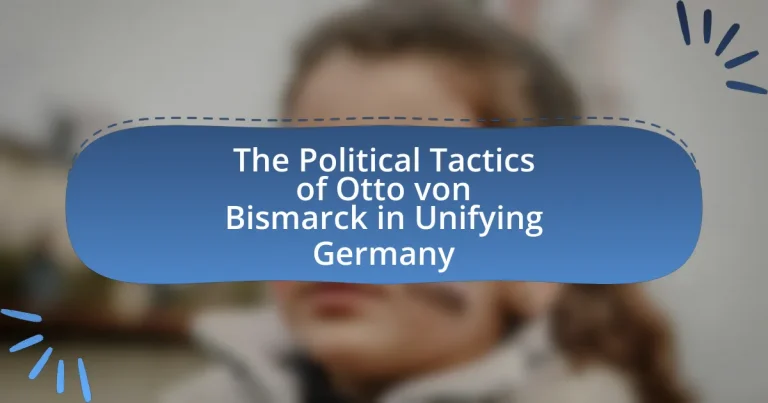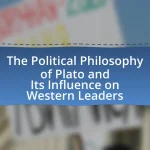The article examines the political tactics employed by Otto von Bismarck in the unification of Germany, highlighting his use of Realpolitik, manipulation of alliances, and strategic wars. Key events such as the Austro-Prussian War and the Franco-Prussian War are analyzed to illustrate how Bismarck rallied German states around Prussia and fostered nationalism. Additionally, the article discusses Bismarck’s diplomatic strategies, domestic policies, and their long-term implications for Germany and Europe, emphasizing the significance of his legacy in shaping modern political landscapes.

What were the key political tactics employed by Otto von Bismarck in unifying Germany?
Otto von Bismarck employed several key political tactics in unifying Germany, including Realpolitik, manipulation of alliances, and strategic wars. Realpolitik, characterized by pragmatic and opportunistic decision-making, allowed Bismarck to prioritize national interests over ideological considerations. He manipulated alliances, such as forming the North German Confederation in 1867, to isolate Austria and strengthen Prussia’s position. Additionally, Bismarck orchestrated wars, notably the Austro-Prussian War in 1866 and the Franco-Prussian War in 1870-1871, to rally German states around Prussia and foster a sense of nationalism. These tactics culminated in the proclamation of the German Empire in 1871, demonstrating Bismarck’s effectiveness in using diplomacy and military strategy to achieve unification.
How did Bismarck’s diplomacy influence German unification?
Bismarck’s diplomacy significantly influenced German unification by employing strategic wars and realpolitik to isolate Austria and France, thereby consolidating power among the German states. His orchestration of the Danish War in 1864, the Austro-Prussian War in 1866, and the Franco-Prussian War in 1870-71 effectively united the German states under Prussian leadership. Bismarck’s manipulation of diplomatic relations, such as the Ems Dispatch, incited French aggression, which rallied the German states around Prussia. This culminated in the proclamation of the German Empire in 1871, demonstrating that Bismarck’s diplomatic maneuvers were crucial in achieving unification.
What specific diplomatic strategies did Bismarck utilize?
Otto von Bismarck utilized several specific diplomatic strategies, including Realpolitik, alliances, and manipulation of international tensions. Realpolitik emphasized pragmatic and strategic decision-making over ideological considerations, allowing Bismarck to navigate complex political landscapes effectively. He formed key alliances, such as the Triple Alliance with Austria-Hungary and Italy in 1882, which strengthened Germany’s position in Europe. Additionally, Bismarck manipulated international tensions, notably through the creation of the Ems Dispatch, which incited the Franco-Prussian War, ultimately leading to German unification in 1871. These strategies were instrumental in consolidating power and achieving his goals of unifying Germany under Prussian leadership.
How did Bismarck’s relationships with other European powers shape his tactics?
Bismarck’s relationships with other European powers significantly shaped his diplomatic and military tactics by allowing him to isolate France and secure alliances that facilitated German unification. For instance, Bismarck skillfully negotiated the Three Emperors’ League in 1873 with Germany, Austria-Hungary, and Russia, which aimed to maintain peace and counterbalance French influence. Additionally, his manipulation of the Austro-Prussian War in 1866 and the Franco-Prussian War in 1870-71 demonstrated his ability to exploit rivalries, such as the tension between Austria and France, to achieve his goals. These tactics were underpinned by Bismarck’s Realpolitik approach, which prioritized pragmatic and strategic alliances over ideological commitments, ultimately leading to the establishment of the German Empire in 1871.
What role did wars play in Bismarck’s unification strategy?
Wars were instrumental in Bismarck’s unification strategy as they provided the means to consolidate German states under Prussian leadership. Bismarck orchestrated three key conflicts: the Danish War (1864), the Austro-Prussian War (1866), and the Franco-Prussian War (1870-1871). Each war strategically weakened rival powers and fostered nationalist sentiment among German states, ultimately leading to the proclamation of the German Empire in 1871. The Austro-Prussian War, for instance, resulted in the exclusion of Austria from German affairs, allowing Prussia to dominate the northern German Confederation. The Franco-Prussian War united the German states against a common enemy, further solidifying national unity and support for Prussian leadership.
Which wars did Bismarck orchestrate to achieve unification?
Otto von Bismarck orchestrated three key wars to achieve German unification: the Danish War (1864), the Austro-Prussian War (1866), and the Franco-Prussian War (1870-1871). The Danish War resulted in the defeat of Denmark and the acquisition of Schleswig and Holstein, which set the stage for further conflict. The Austro-Prussian War led to the exclusion of Austria from German affairs and the establishment of the North German Confederation under Prussian leadership. Finally, the Franco-Prussian War united the German states against a common enemy, culminating in the proclamation of the German Empire in 1871 at the Palace of Versailles. These wars were instrumental in consolidating Bismarck’s vision of a unified Germany under Prussian dominance.
How did Bismarck manipulate public opinion during these conflicts?
Bismarck manipulated public opinion during conflicts by utilizing strategic nationalism and orchestrating diplomatic incidents that rallied public support. He crafted a narrative that portrayed Prussia as a defender of German interests, particularly against perceived threats from Austria and France. For instance, during the Austro-Prussian War of 1866, Bismarck emphasized the need for a unified German state free from Austrian influence, which resonated with nationalist sentiments among the populace. Additionally, the manipulation of the Ems Dispatch in 1870 incited outrage against France, uniting the German states against a common enemy and fostering a sense of national pride. These tactics effectively swayed public opinion to support his aggressive foreign policy and the unification of Germany under Prussian leadership.
What was the significance of the German Empire’s formation under Bismarck?
The formation of the German Empire under Bismarck was significant because it marked the unification of various independent German states into a single nation-state, fundamentally altering the political landscape of Europe. This unification was achieved through a series of wars and diplomatic maneuvers orchestrated by Bismarck, notably the Austro-Prussian War of 1866 and the Franco-Prussian War of 1870-71, which fostered a sense of nationalism among the German people. The establishment of the German Empire in 1871 not only consolidated power within Germany but also shifted the balance of power in Europe, leading to increased tensions and rivalries, particularly with France. Bismarck’s tactics, including realpolitik and strategic alliances, were crucial in achieving this unification, demonstrating his role as a key architect of modern Germany.
How did the establishment of the German Empire alter the political landscape of Europe?
The establishment of the German Empire in 1871 significantly altered the political landscape of Europe by creating a powerful, unified German state that shifted the balance of power. This unification, orchestrated by Otto von Bismarck, led to the decline of French influence and the emergence of Germany as a dominant military and economic force. The new empire’s military strength was exemplified by its victory in the Franco-Prussian War, which not only solidified German unity but also instigated a sense of vulnerability in France, prompting it to seek alliances for security. Consequently, the establishment of the German Empire contributed to the formation of complex alliances, such as the Triple Alliance with Austria-Hungary and Italy, which heightened tensions and set the stage for future conflicts in Europe, including World War I.
What were the immediate effects of unification on German society?
The immediate effects of unification on German society included the establishment of a centralized German Empire, which significantly altered political, economic, and social structures. The unification led to the creation of a strong national identity among the German states, fostering a sense of unity and pride. Economically, the unification facilitated the development of a single market, removing trade barriers and promoting industrial growth, evidenced by the rapid expansion of railways and industries in the following years. Socially, the unification intensified class divisions and sparked nationalist movements, as various groups sought to assert their interests within the new political framework. These changes were pivotal in shaping modern Germany and its societal dynamics.
How did Bismarck’s domestic policies support his unification efforts?
Bismarck’s domestic policies supported his unification efforts by fostering a sense of national identity and consolidating power within the Prussian state. He implemented policies such as the Kulturkampf, aimed at reducing the influence of the Catholic Church, which helped to unify Protestant and Catholic Germans under a common national identity. Additionally, Bismarck’s social welfare programs, including health insurance and pensions, garnered popular support and loyalty to the state, further strengthening the idea of a unified Germany. These policies not only centralized authority but also created a cohesive national sentiment that facilitated the political and military maneuvers necessary for unification, exemplified by the successful wars against Austria and France.
What social policies did Bismarck implement to strengthen national unity?
Otto von Bismarck implemented several social policies to strengthen national unity, primarily through the introduction of social welfare programs. These included health insurance, accident insurance, and old-age pensions, which were established between 1883 and 1889. The health insurance law of 1883 provided workers with medical care and financial support during illness, while the accident insurance law of 1884 offered compensation for work-related injuries. The old-age pensions law of 1889 created a system for financial support for the elderly. These policies aimed to integrate the working class into the national framework, reduce socialist influence, and foster loyalty to the state, thereby promoting a sense of unity among the diverse German population.
How did Bismarck’s social welfare programs impact public support?
Bismarck’s social welfare programs significantly increased public support for the German state. By implementing health insurance, accident insurance, and old-age pensions between 1883 and 1889, Bismarck aimed to alleviate social issues and reduce the appeal of socialism. These programs provided financial security to workers, fostering loyalty to the state and diminishing the influence of socialist movements. The introduction of these welfare measures resulted in a marked increase in the popularity of the government, as evidenced by the rise in conservative party votes in subsequent elections, demonstrating that Bismarck’s strategy effectively garnered public backing for his political agenda.
What role did education reform play in fostering a unified German identity?
Education reform played a crucial role in fostering a unified German identity by standardizing curricula and promoting a common cultural and linguistic framework across the German states. Under Otto von Bismarck’s leadership, educational policies emphasized the teaching of the German language, history, and values, which helped to cultivate a sense of national identity among diverse populations. For instance, the introduction of a unified education system in the 1870s aimed to instill loyalty to the German Empire and diminish regional differences. This approach was supported by the establishment of state-controlled schools that reinforced nationalistic sentiments, thereby contributing to the overall process of unification.
How did Bismarck manage opposition to his policies?
Bismarck managed opposition to his policies through a combination of political maneuvering, strategic alliances, and legislative actions. He utilized the “Realpolitik” approach, prioritizing pragmatic solutions over ideological consistency, which allowed him to navigate and suppress dissent effectively. For instance, Bismarck implemented the Anti-Socialist Laws in 1878, which banned socialist organizations and publications, significantly curtailing the influence of the socialist movement. Additionally, he formed alliances with conservative factions and the Catholic Center Party to isolate and weaken opposition from liberals and socialists, thereby consolidating his power and advancing his unification agenda.
What strategies did Bismarck use to suppress dissent?
Bismarck employed several strategies to suppress dissent, including censorship, political repression, and the use of state surveillance. He implemented strict press laws that limited freedom of expression, effectively silencing opposition voices. Additionally, Bismarck targeted political groups, particularly socialists, through the Anti-Socialist Laws of 1878, which banned socialist organizations and publications. This legal framework allowed for the arrest and persecution of dissenters, thereby consolidating his control over the political landscape. Furthermore, Bismarck utilized a network of informants to monitor potential threats, ensuring that dissent was swiftly addressed before it could gain traction. These strategies collectively reinforced Bismarck’s authority and facilitated the unification of Germany under his leadership.
How did Bismarck’s approach to political parties affect his unification goals?
Bismarck’s approach to political parties significantly advanced his unification goals by strategically manipulating party dynamics to consolidate power and eliminate opposition. He utilized a policy of realpolitik, which allowed him to align with various political factions, such as the National Liberals, to gain support for his unification efforts while simultaneously marginalizing socialist and Catholic parties that opposed him. For instance, Bismarck’s alliance with the National Liberals facilitated the passage of key legislation, including military reforms and the establishment of the North German Confederation in 1867, which were crucial steps toward unification. His ability to navigate and exploit the political landscape ensured that he could implement his vision for a unified Germany, demonstrating the effectiveness of his political maneuvering in achieving his objectives.
What were the long-term implications of Bismarck’s tactics on Germany and Europe?
Bismarck’s tactics had significant long-term implications for Germany and Europe, primarily establishing Germany as a major power while fostering tensions that contributed to future conflicts. His diplomatic strategies, such as the creation of the Triple Alliance with Austria-Hungary and Italy, solidified Germany’s position in Europe but also alienated other nations, particularly France. The isolation of France and the balance of power he sought to maintain ultimately laid the groundwork for the alliances that would lead to World War I. Additionally, Bismarck’s policies of realpolitik and militarism influenced European politics, encouraging other nations to adopt similar aggressive stances, which further escalated tensions across the continent.
How did Bismarck’s legacy influence future German leaders?
Bismarck’s legacy significantly influenced future German leaders by establishing a model of pragmatic statecraft and realpolitik that prioritized national unity and power over ideological purity. His approach to governance, characterized by strategic alliances and manipulation of political circumstances, set a precedent for subsequent leaders like Wilhelm II and Adolf Hitler, who adopted similar tactics to consolidate power and pursue aggressive policies. For instance, Bismarck’s use of the Kulturkampf and the manipulation of social policies to undermine political opponents demonstrated the effectiveness of using state mechanisms to achieve political ends, a strategy later echoed in the policies of the Weimar Republic and Nazi Germany. This legacy of prioritizing state interests and employing calculated diplomacy shaped the political landscape of Germany well into the 20th century.
What lessons did later politicians learn from Bismarck’s methods?
Later politicians learned the importance of realpolitik and pragmatic diplomacy from Bismarck’s methods. Bismarck’s approach emphasized the need for practical solutions over ideological purity, allowing him to navigate complex political landscapes effectively. His use of strategic alliances, such as the Triple Alliance with Austria-Hungary and Italy, demonstrated the value of forming coalitions to achieve national goals. Additionally, Bismarck’s ability to manipulate public opinion and utilize statecraft, including the use of wars to unify Germany, taught future leaders the significance of controlling narratives and leveraging conflict for political gain. These lessons have influenced various political strategies in modern governance, highlighting the enduring relevance of Bismarck’s tactics.
How did Bismarck’s tactics set the stage for future conflicts in Europe?
Bismarck’s tactics, particularly his use of realpolitik and strategic alliances, set the stage for future conflicts in Europe by fostering a climate of mistrust and competition among nations. His orchestration of the Franco-Prussian War in 1870-1871 not only unified Germany but also humiliated France, leading to a desire for revenge that contributed to tensions in Europe. Additionally, Bismarck’s complex system of alliances, such as the Triple Alliance with Austria-Hungary and Italy, created a polarized environment that would later escalate into World War I. The diplomatic isolation of France and the manipulation of nationalist sentiments among various ethnic groups further destabilized the continent, laying the groundwork for future conflicts.
What can modern leaders learn from Bismarck’s political strategies?
Modern leaders can learn the importance of pragmatism and strategic alliances from Bismarck’s political strategies. Bismarck effectively utilized realpolitik, prioritizing practical outcomes over ideological purity, which allowed him to navigate complex political landscapes. For instance, his orchestration of the Austro-Prussian War in 1866 and the Franco-Prussian War in 1870-71 demonstrated his ability to manipulate diplomatic relations to achieve national unification. By forming the North German Confederation and later the German Empire, Bismarck showcased the effectiveness of calculated diplomacy and military strategy in achieving political goals. His approach emphasizes the value of adaptability and the necessity of forming coalitions to advance objectives, lessons that remain relevant for contemporary leaders facing multifaceted global challenges.
How can Bismarck’s diplomatic techniques be applied in contemporary politics?
Bismarck’s diplomatic techniques can be applied in contemporary politics through strategic alliances, realpolitik, and the use of diplomacy to isolate adversaries. His approach emphasized pragmatic decision-making over ideological commitments, allowing for flexible alliances that can adapt to changing political landscapes. For instance, Bismarck’s ability to form the Triple Alliance with Austria-Hungary and Italy in 1882 demonstrates how modern leaders can leverage partnerships to enhance national security and influence. Additionally, his skill in manipulating public opinion and using diplomacy to create divisions among rivals can inform current political strategies, as seen in contemporary geopolitical maneuvering where nations seek to weaken opponents through strategic communication and coalition-building.
What are the best practices for balancing domestic and foreign policy based on Bismarck’s experience?
The best practices for balancing domestic and foreign policy based on Bismarck’s experience include pragmatic diplomacy, strategic alliances, and maintaining internal stability. Bismarck effectively utilized pragmatic diplomacy by prioritizing realpolitik, which allowed him to navigate complex international relations while ensuring domestic support. His formation of strategic alliances, such as the Triple Alliance with Austria-Hungary and Italy, exemplified how foreign policy could reinforce domestic goals by isolating France and securing Germany’s position in Europe. Additionally, Bismarck focused on internal stability through social reforms, such as the introduction of social insurance programs, which helped mitigate domestic unrest and fostered a sense of national unity. These practices demonstrate that a careful balance between domestic needs and foreign ambitions can lead to successful governance, as evidenced by Bismarck’s ability to unify Germany and maintain its power in Europe during his tenure.


